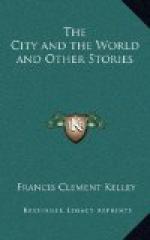“And the work is all Father Ramoni’s?” the novice asked.
“All.” Father Tomasso drew him a little farther from the group that still listened to the little priest who had come from the Vatican. “Father Ramoni found that the people had many Christian traditions and were almost white; but it was he who instilled the Faith in their hearts. There must be thirty of our Fathers in Marqua now,” he continued proudly, “and sooner or later, all novices will have to go out there. Father Ramoni has made a splendid Prefect-Apostolic. No wonder they have summoned him to Rome for consultation. I have heard”—he lowered his voice as he glanced over his shoulder to where Father Denfili sat on the bench by the pond—“that it is certain that Marqua is to be made a Province, with an archbishop and two bishops. There is a seminary in Marqua, even now, and they are training some of the natives to be catechists. I tell you, Brother Luigi, missionary history has never chronicled such wonders as our Father Ramoni has wrought.”
From behind them came the rising voice of the little priest, bubbling into laughter. “And as I came through the Pincio all that I heard was his name. I had to wait for a duchessa’s carriage to pass. She was telling an American woman of the times when Father Ramoni had preached at San Carlo. ‘His words would convert a Hindu,’ she was saying. And the Marchesi di San Quevo leaned from his horse to tell me that he had heard that Father Ramoni will be one of the Cardinals of the next Consistory. Is it not wonderful?”
The murmur of their responses went across the garden to old Father Denfili. Father Tomasso, crossing the path with the novice, suddenly saw a strange look of pain on the old priest’s face, and started toward him just as the gate to the cloister garden swung back, revealing a picture that held him waiting. Four men—a great Roman prelate, the General of San Ambrogio, Father Ramoni and Father Pietro, Ramoni’s secretary—were coming into the garden. Of the four Father Ramoni stood out in the center of the group as vividly as if a searchlight were playing on his magnificent bigness. His deep black eyes, set in a face whose strength had been emphasized by its exposure to sun and wind, gleamed joyous with his mood. His mouth, large, expressive, the plastic mouth of the orator, was curving into a smile as he gave heed to the speech of the prelate beside him. Once he shook his head as the great man, oblivious of their coming before a crowd of intent watchers, continued the words he had been saying on Via Paoli.




